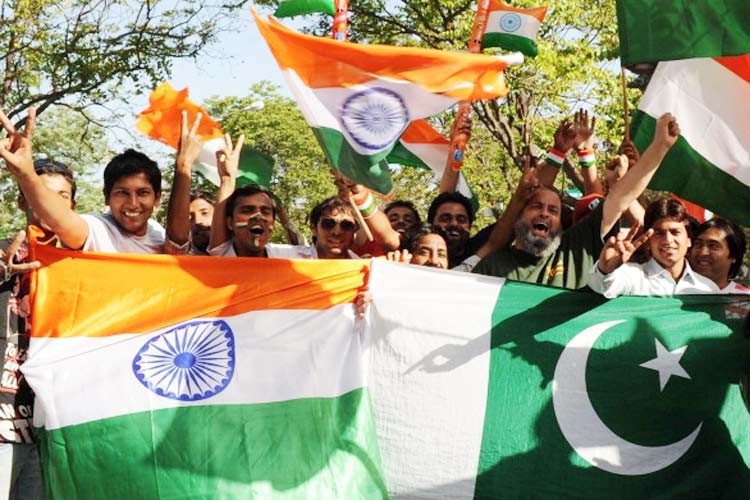
India and Pakistan must preserve a willingness to talk to each other

The gunfire that erupted at Pathankot can drown out the renewed hope of peace between India and Pakistan. The only way of ensuring this does not happen is by keeping channels of communication open.
Pakistan and India cannot escape each other and nor should they -- since the potential for human development and progress is immense if our two countries work together. Our leaders must keep talking since communication, even without expressing intention, keeps doorways of progress open. The people who are trying to jeopardise the peace process know this fully well. That is precisely the reason they orchestrate cowardly attacks and hope that communication will come to a standstill.
As long as we keep talking, we the people of the region win and they who want violence lose.
I know that this is easier said than done. Hawks in both countries will dig up the past and engage in rhetoric of disservice to the past, the lives lost, the wounds that never healed. But the greatest service that we can do to those who have died or suffered because of the animosity is to ensure that the suffering of the collective does not continue. This requires will, looking past our biases, communication and nuance.
All Pakistanis that I know condemn the attacks in Pathankot. Of course there are extremists in each country that celebrate violence as a policy but Pakistanis and Indians on the whole do not want violence. Those who celebrate or demand violence can be marginalised -- but this will require some effort. We must resist the temptation to put nationalism ahead of humanity when dealing with each other. This does not mean that we stop respecting each other as sovereign states but only that we do not let the colour of our passports trump our imagination as human beings.
The media rhetoric does not help this. Soon after the Pathankot terror attacks the Indian media blamed Pakistan. What does that mean to the average Pakistani who wants peace with India and who cannot imagine a wedding or any celebration (including an intimate evening with friends) without Bollywood music? The average Pakistani then feels confused as to why his entire country is being blamed. Before he can think through this, the Pakistani media picks up the baton and runs with it -- accusing India of always blaming Pakistan. A shouting match ensues where everyone loves the sound of their own voices -- communication is not a priority only political point-scoring is.
By the time the shouting match is over, flames of hate are smouldering again. People on both sides are alienated in this process as the media-hate monger nexus (and this nexus is ideological not financial) gains strength. Pakistanis feel aggrieved by the Indian media’s discourse because it seems insensitive and completely oblivious of how terrorism has affected us: to a country that has lost 50,000 of its men, women and children the accusation of sponsoring violence provoke anger.
This is not meant to deny that there are elements within Pakistan that continue to plan and orchestrate violence against India. It has indeed happened in the past (and Pakistan will have similar claims). Pakistanis mourned Mumbai just like India mourned Peshawar. I acknowledge there are grievances and great mistrust from both sides -- regarding Afghanistan, Balochistan, Kashmir and much more.
But the Indian media must not assume that Pakistani state actors, and more importantly Pakistani people, are oblivious of the pain of terrorism or that we do not care. The same hate-filled ideology hurts us. The same violence by non-state actors has coloured our schools, mosques, churches, temples and streets with blood. The same bullets are often targeted at us.
Granted that the Indian state and media feels that our spy agencies are out of control. But even that is a gross generalisation. Why must it be assumed that Pakistani state, military or state actors are sponsoring violence? Why cannot we talk about the fact that Pakistan has made fundamental shifts in its policies towards extremism and militancy? And that as we push ahead with this policy, the violent non-state actors are hitting back at us as well as India?
India’s best bet is to bank on democratic forces as they negotiate the terrain at home. And, this is important to remember, Pakistanis cannot and will not alienate their military when the same military is fighting to save Pakistan from extremism. India’s media must resist the temptation to blame the ISI without cogent evidence. It is entirely possible to argue that Pakistani state is often not strong enough to prevent violent attacks being planned from here -- and this affects Pakistan just as much as India. Why not work together to ensure that these violent non-state actors are acted against instead of demonising each other’s state actors or entire people?
History and the past may be good grounds for cynicism but then both sides can accuse each other of a lot. Both states have been unjust towards each other. Both have made mistakes. And now doing a ‘one-up’ on each other is useless because it will not solve anything. And if the aim is win a war of words with each other then we might as well invite our common enemies to celebrate a victory. But the aim has to be to make progress -- going beyond where fear and hate-filled imaginations stop.
Scholars have written how "partition" actually took place post-1947 and not in 1947 -- our imaginations, sympathies and dreams of a peaceful co-existence have been partitioned. But we must insist on and preserve a willingness to talk to each other, to imagine a better tomorrow. In conversations there is always hope.